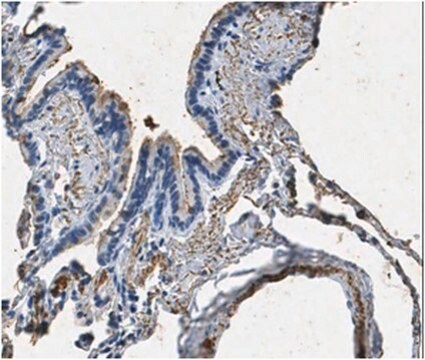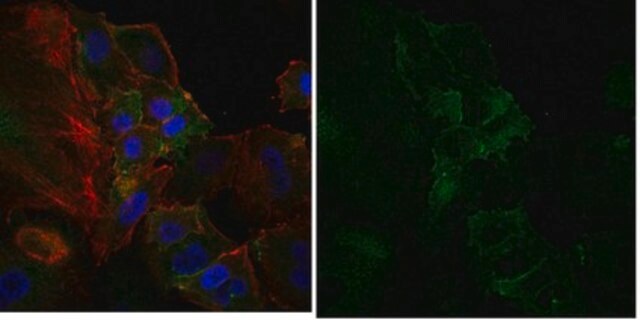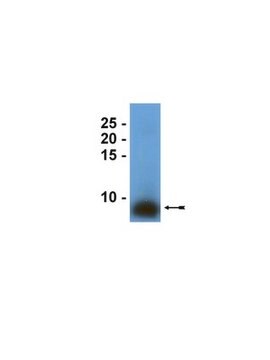General description
Pulmonary surfactant-associated protein D (UniProt P35247; also known as Collectin-7, Lung surfactant protein D, PSP-D, SP-D) is encoded by the SFTPD (also known as COLEC7, PSPD, SFTP4) gene (Gene ID 6441) in human. Surfactant, produced by alveolar type II cells and airway Clara cells, resides at the air-liquid interface of the lungs and is most commonly known for its role in reducing surface tension. Surfactant is a lipoprotein complex composed of approximately 10% proteins, including surfactant protein A (SP-A), SP-B, SP-C, and SP-D. SP-A and SP-D belong to the collectin family of proteins and can modulate innate immunity. SP-D is known to enhance pulmonary clearance of pathogens, such as Pseudomonous aerginosa, Klebsiella pneumonia, respiratory syncytial virus (RSV) and Influenza virus. SP-D is also shown to modify allergic responsee in the lungs by binding common allergens, including house dust mite and pollen particles. SP-A-deficient and SP-D-deficient mice are susceptible to bleomycin-induced lung injury and display increased cellular inflammation, more severe lung fibrosis, and reduced survival. In addition to lung, SP-D is also reported to be detected in extrapulmonary tissues, such as kidney and pancreas. Serum levels of either SP-A or SP-D in human are correlated with mortality in patients with pulmonary fibrosis. Human SP-D is produced with a signal peptide sequence (a.a. 1-20), which is removed posttranslationally to yield the mature protein (a.a. 21-375) that contains a collagen-like domain (a.a. 46-222), a coiled coil region (a.a. 223-252), and a C-type lectin domain (a.a. 260-375).
Specificity
This rabbit polyclonal antibody targets a sequence within the C-type lectin domain of human surfactant protein D.
Immunogen
Epitope: domain of:
KLH-conjugated linear peptide corresponding to a sequence within the C-type lectin domain of human surfactant protein D.
Application
Detect Surfactant Protein D using this rabbit polyclonal Anti-Surfactant Protein D Antibody, Cat. No. ABS574, validated for use in Immunohistochemistry and Western Blotting.
Immunohistochemistry Analysis: A 1:1,000 dilution from a representative lot detected surfactant protein D in human lung and pancreas tissue sections.
Research Category
Signaling
Quality
Evaluated by Western Blotting in A549 cell lysate.
Western Blotting Analysis: 0.2 µg/mL of this antibody detected surfactant protein D in 10 µg of A549 cell lysate.
Target description
~48 kDa observed. Target band size appears larger than the calculated molecular weights of 35.50/37.73 kDa (mature/pro-form) due to posttranslational modifications. Uncharacterized bands may be observed in some lysate(s).
Physical form
Affinity purified.
Purified rabbit polyclonal antibody in buffer containing 0.1 M Tris-Glycine (pH 7.4), 150 mM NaCl with 0.05% sodium azide
Storage and Stability
Stable for 1 year at 2-8°C from date of receipt.
Other Notes
Concentration: Please refer to lot specific datasheet.
Disclaimer
Unless otherwise stated in our catalog or other company documentation accompanying the product(s), our products are intended for research use only and are not to be used for any other purpose, which includes but is not limited to, unauthorized commercial uses, in vitro diagnostic uses, ex vivo or in vivo therapeutic uses or any type of consumption or application to humans or animals.









